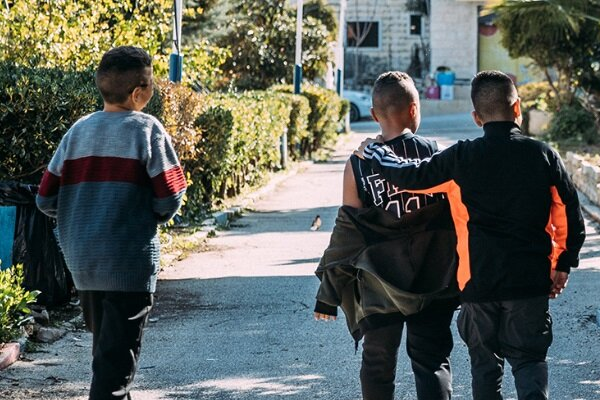Children from Gaza use paint to express their traumas

68 children from the SOS Children's Villages in Rafah were successfully evacuated to Bethlehem in the West Bank in mid-March, accompanied by Mutaz Lubbad, a psychologist. In this interview, he talks about their psychological state and the help they need most urgently.
How are the children who were evacuated from Rafah?
After more than five months of war, they feel protected again for the first time. That is the most important thing: we have survived and are safe. But the children are very tired and need to recover from the war and the exhausting journey.
How do you support them?
We give them time and help them get a feel of their new surroundings. None of the children have ever left Gaza before. We take city tours, offer leisure activities, and play football. Yesterday, we had a magician's visit. Every day, we meet for mindfulness sessions. These are all things that help us relax and settle in. In addition, targeted psychological support is also needed.
At SOS Children's Villages in Rafah, the children were looked after, but war and bombings were ever-present there too. What did that do to their psyche?
The effects are diverse: fear, restlessness, sleep disorders, problems socializing with others, and developmental setbacks. Many of these things also affect them here in Bethlehem. One child came to me and said that he still couldn't sleep. Some still don't talk about their experiences at all, and others simply can't play.
How do you react as a psychologist in these cases?
It's very individual. It is important to proceed gently and not to push the children. Group therapy helps some, but others need individual support. Art therapy is often a good approach: many children find it easier to paint bad experiences or feelings than to talk about them. In Gaza, this was a critical approach for us.
What do you mean by that?
Every child at SOS Children's Villages in Rafah created a book, " My Life Story in Gaza," with text, pictures, and whatever they wanted. The children enjoyed working on the books, and it helped them process their experiences. It was relieving for them to find a way to express their horror, pain, and fear. The pictures and texts showed us how the children felt, their condition, and how we could best support them. We took all the books with us to Bethlehem.
The children's caregivers also travelled with them. How are they doing?
They focused on caring for the children and tried to hold back their feelings. But of course, they also went through a lot of anxiety. It is important that we also provide them with psychological support.
How long will it take for the children and adults to overcome what they have experienced?
It can take anywhere from a few weeks to months or longer. But we are now in a good position: the basic needs have been met, which is important for healing to take place.
The work of SOS Children's Villages in Rafah is continuing. Your colleagues there are supporting children and families. What kind of help is possible when there is a war going on at the same time?
At SOS Children's Villages in Rafah, we mainly support children who have lost their families in the war. Although most of them have suffered severe trauma, we see how their condition improves as they rest and receive care and psychological support. We also support families with psychological first aid. We show them simple techniques to help them relax, at least temporarily, and better cope with the stress. I think that's very important.
